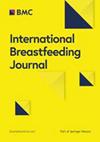“Work with us… to make it more accessible”. What women with intellectual disabilities want from infant-feeding health resources: an exploratory study
IF 2.9
2区 医学
Q1 OBSTETRICS & GYNECOLOGY
引用次数: 0
Abstract
More women with intellectual disabilities are becoming mothers but fewer are known to breastfeed compared with other women. Women with intellectual disabilities are entitled to accessible antenatal and infant feeding information, yet are rarely asked for their views on available resources. This article reports on the final stage of a UK project exploring how women with intellectual disabilities are supported to make infant feeding decisions. The wider project includes a scoping review and interviews with healthcare professionals, here we focus on the voices of the women themselves. Four women with an intellectual disability participated in a focus group where they were asked to give their views on the accessibility of currently available infant feeding resources and on alternative representations of infant feeding. All were interested in women’s health issues, including infant feeding. Photo-elicitation was used to gather views on videos, bespoke ‘Easy Read’ material and several alternative representations of infant feeding. A transcription of the discussion was thematically analysed whilst a critical visual analysis was undertaken of the women’s preferred images/resources. The study took place in Bristol, UK, during 2022. Two themes were identified from the group discussion: ‘The desire for choice’ and ‘How easy is ‘Easy Read’?’ The desire for choice was expressed in terms through agreements and disagreements about preferred imagery, differing tastes, and reasons for these preferences. We identified a challenge to ‘Easy Read’ as a default standard and concerns that some forms of ‘Easy Read’ can confuse rather than inform. Critical visual analysis identified the importance of the story and social setting of the preferred infant feeding image. Findings suggest a need for a suite of resources, avoiding the one-size-fits-all approach, including people with an intellectual disability at every stage of the design and production process. Resources should recognise and embrace differences in terms of understanding, visual literacy and cultural taste, as well as being freely available to support women with intellectual disabilities to make informed infant feeding decisions. An accessible film was co-produced, to disseminate the findings from all three stages of the completed project."与我们合作......使其更加无障碍"。智障妇女对婴儿喂养保健资源的需求:一项探索性研究
越来越多的智障妇女成为母亲,但与其他妇女相比,母乳喂养的智障妇女人数较少。智障妇女有权获得无障碍的产前和婴儿喂养信息,但却很少被问及她们对现有资源的看法。本文报告了英国一项探讨如何帮助智障妇女做出婴儿喂养决定的项目的最后阶段。这个更广泛的项目包括范围界定审查和对医疗保健专业人员的访谈,在此,我们将重点关注智障妇女自己的声音。四名智障妇女参加了一个焦点小组,她们被要求就目前可用的婴儿喂养资源的可获得性以及婴儿喂养的其他表述发表意见。她们都对包括婴儿喂养在内的妇女健康问题很感兴趣。通过图片征询,收集了她们对视频、定制的 "易读 "材料和几种婴儿喂养替代表述的意见。在对讨论记录进行主题分析的同时,还对妇女偏好的图片/资源进行了批判性的视觉分析。这项研究于 2022 年在英国布里斯托尔进行。小组讨论确定了两个主题:"对选择的渴望 "和"'易读'有多简单?"对选择的渴望表现在对首选图像、不同口味和这些首选的原因的同意和不同意上。我们发现了将 "易读 "作为默认标准所面临的挑战,以及对某些形式的 "易读 "可能造成混淆而非提供信息的担忧。批判性视觉分析确定了首选婴儿喂养图像的故事和社会背景的重要性。研究结果表明,有必要提供一整套资源,避免 "一刀切 "的做法,让智障人士参与到设计和制作过程的每一个阶段。资源应承认并接受理解能力、视觉素养和文化品味方面的差异,并免费提供,以支持智障妇女做出明智的婴儿喂养决定。我们还共同制作了一部无障碍影片,以传播已完成项目所有三个阶段的研究成果。
本文章由计算机程序翻译,如有差异,请以英文原文为准。
求助全文
约1分钟内获得全文
求助全文
来源期刊

International Breastfeeding Journal
Medicine-Obstetrics and Gynecology
CiteScore
6.30
自引率
11.40%
发文量
76
审稿时长
32 weeks
期刊介绍:
Breastfeeding is recognized as an important public health issue with enormous social and economic implications. Infants who do not receive breast milk are likely to experience poorer health outcomes than breastfed infants; mothers who do not breastfeed increase their own health risks.
Publications on the topic of breastfeeding are wide ranging. Articles about breastfeeding are currently published journals focused on nursing, midwifery, paediatric, obstetric, family medicine, public health, immunology, physiology, sociology and many other topics. In addition, electronic publishing allows fast publication time for authors and Open Access ensures the journal is easily accessible to readers.
文献相关原料
| 公司名称 | 产品信息 | 采购帮参考价格 |
|---|
 求助内容:
求助内容: 应助结果提醒方式:
应助结果提醒方式:


